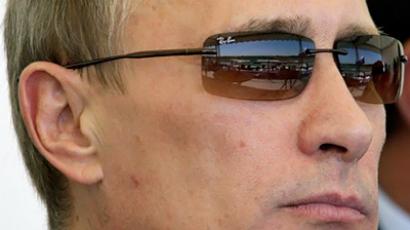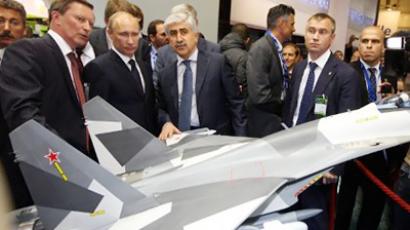UFO over Paris? Unique Russian 4++ gen fighter rocks Paris Air Show (VIDEO)
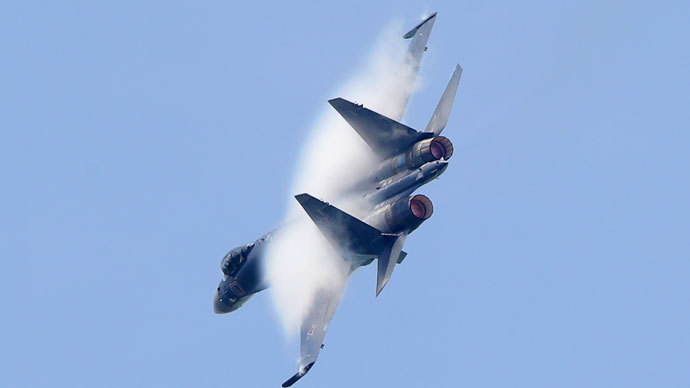
Russia’s Sukhoi has rocked the 50th Paris Air Show at Le Bourget with the premiere of its cutting-edge Su-35 fighter. Super-maneuverable even for a Sukhoi, the Su-35 has been dubbed the “UFO” for its outstanding maneuverability.
The Sukhoi Su-35 (NATO classification: Flanker E), Russia’s newest, super-maneuverable, multirole fighter jet has conducted its first training flight at the Paris Air Show, and aircraft industry experts were reportedly wowed by the jet’s performance.
“The plane easily passes from low-speed super-maneuverability mode to high-speed combat flight,” test pilot Sergey Bogdan said. Bogdan will pilot all Su-35 flights at the Paris Air Show. The engines are so powerful that the plane could be pulled out of any complicated situation, like a spin, at pilot’s will, he explained: “All you need is to get with the plane on the same wave, to caress and stroke it because, you know, it is a living being.”
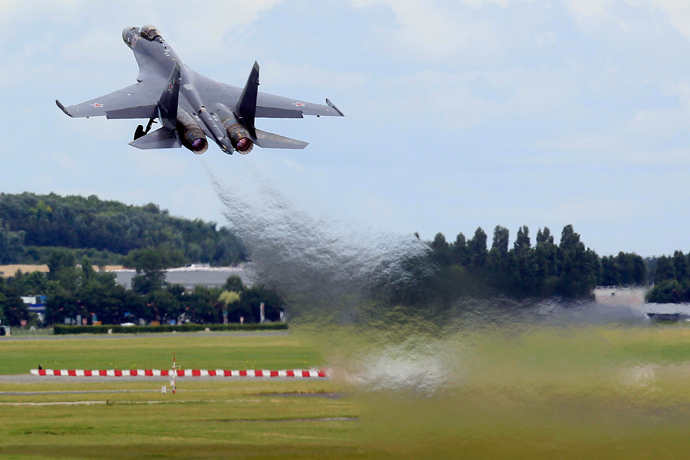
There will be little competition for the Su-35 at the Paris Air
Show, primarily because sequestration in the US Military’s budget
has left Le Bourget without any US Military airplanes present,
either for displays or show flights. The Su-35 has become the
first Russian fighter jet to take part in the Paris Air Show
since 2001, while this is the first time 1991 the US has not
presented a fighter jet at Le Bourget.
This 4++ generation aircraft uses fifth-generation technology,
and its advanced avionics, new engines, and remarkable weapons
array mounted on 12 external hardpoints outperform any existing
fourth-generation fighter.

It has top speed of 2,400 km/h, a 3,600 kilometer range, an 18 kilometer ceiling, and an advanced radar system to detect large targets from as far as 400 kilometers.
Probably the only major feature that the Su-35 lacks - and which prevents it from being labeled fifth-generation - is limited stealth capability, as only some parts of its airframe are made of composite material. Nonetheless, it can detect stealth aircraft such as the US’s F-35 at a distance of over 90 kilometers.
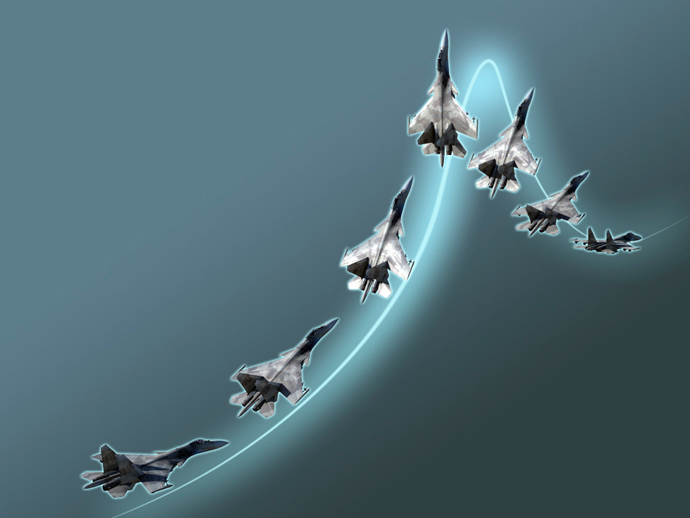
The aircraft’s thrust/weight ratio is unique at a kilo of thrust per kilo of aircraft weight, thanks to a pair of brand new 117C jet engines.
This enables Su-35 to perform all current stunts, including Russian specialties such as Pugachev's Cobra, the Frolov Chakra, the Dead Leaf, and the unprecedented Pancake, which is an horizontal 360-degree made turn without losing speed. The Pancake is performed only by the Su-35.
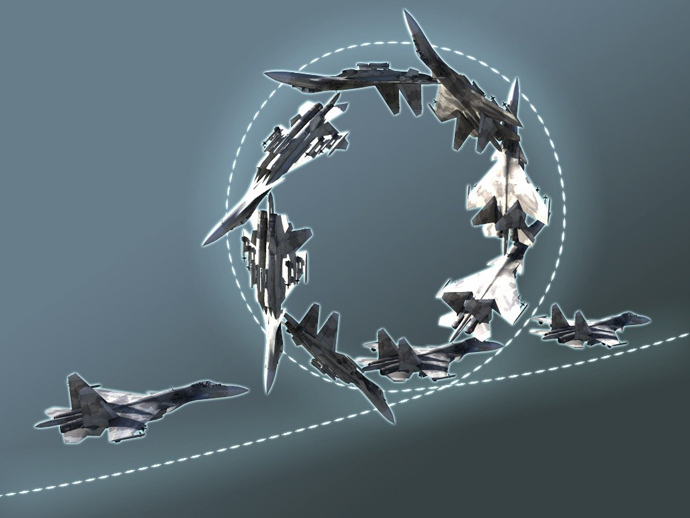
The Su-35’s technical specifications:
• Powerplant: Two 142.2 kN, 117C afterburning turbofans produced by NPO Saturn
• Dimensions: Length 21.9 m; height 5.9 m; wing span 15.3 m
• Weight: Empty 18,400 kg; Normal Take-Off Weight 25,300 kg; Max Take-Off Weight 34,500 kg; Internal Fuel: 11,500 kg
• Performance: Max level speed at 11,000m Mach 2.25 or 2,400 km/h; at sea level 1,400 km/h; service ceiling 18,000 m; G-limit: +14
• Armament: one internal GSh-301 30mm cannon with 150 rounds; up to 8,000 kg of ordnance carried on up to twelve external hardpoints, including air-to-air missiles, air-to-surface guided missiles, guided bombs, or external fuel tanks.
With these characteristics, the Su-35 surpasses practically all
modern fighter jets such as France’s Rafale, Sweden’s Gripen, the
Eurofighter 2000, and the modernized US F-15, F-16, and F-18. It
is on a par with the fifth-generation US F-35 and F-22A, neither
of which are currently on the market.
The Su-35 is generating so much interest that the airshow organizers have assigned it a spot right in the middle of the main avenue of the exhibition.
The Russian Air Force currently has 10 Su-35s, to be
increased to 48 by the end of 2015.
The first country to buy a Sukhoi Su-35 could be China, as Beijing is already in talks with the manufacturer: “We have signed an intergovernmental agreement on the supply of Su-35 planes to China," Aleksandr Mikheyev, deputy head of Russian arms corporation Rosoboronexport told reporters.
"As of today we have a legal base with China. An agreement on
the protection of intellectual property has been signed,"
Mikheyev added. Beijing reportedly intends to buy 24 Su-35s, with
a contract due to be signed by the end of 2013.

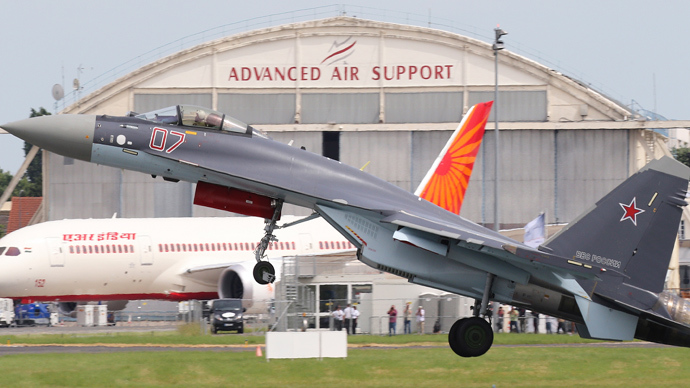

Two other Russian aircraft will also debut at Le Bourget: The Yakovlev Yak-130 ‘Mitten,’ a subsonic two-seat light attack jet, and the Kamov Ka-52 ‘Alligator,' a coaxial helicopter gunship.
But the first demonstration flight of a Ka-52 has already been accompanied by a minor scandal, as the gunship was banned from its scheduled flight. Two Eurocopter Tiger helicopters performed in the program instead.

“The crew started the engine and began the taxing maneuver when it received the organizers' instruction to return to the static parking area and to stop the engine,” a Kamov spokesperson said.
A source in the Russian delegation said the "organizers explained this by the fact that the French prime minister was visiting the air show at the moment." The source said that if the European helicopters had flown after the Ka-52, they would have attracted less attention.
Later in the day, the Alligator finally made it to the skies, though the exhibition was already closing and many of the guests had already left the show. A demonstration flight of a Yak-130 trainer took place on schedule.

The airshow at the Le Bourget exhibition center takes place from June 17 to 23, and opens to the public on June 21. The event brings together over 3,000 aircraft manufacturers from 44 countries: 1,040 French, 350 American, 124 German and 115 Italian. Forty-six of these companies, including Sukhoi, are Russian.
Last year’s Le Bourget airshow saw a record $100 billion in contracts signed; organizers expect at least $125 billion to be signed this year.
Some 70 percent of the more than 140 aircraft being exhibited are civil, and the rest are military. Around 40 aircraft will give flight demonstrations.













